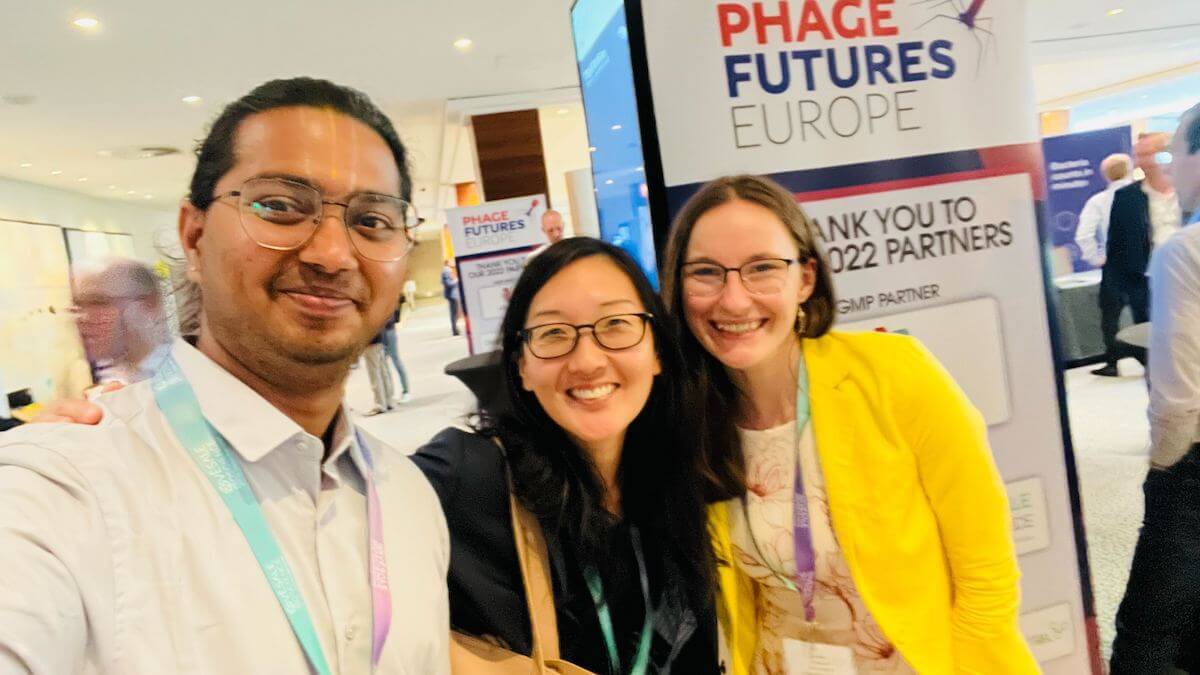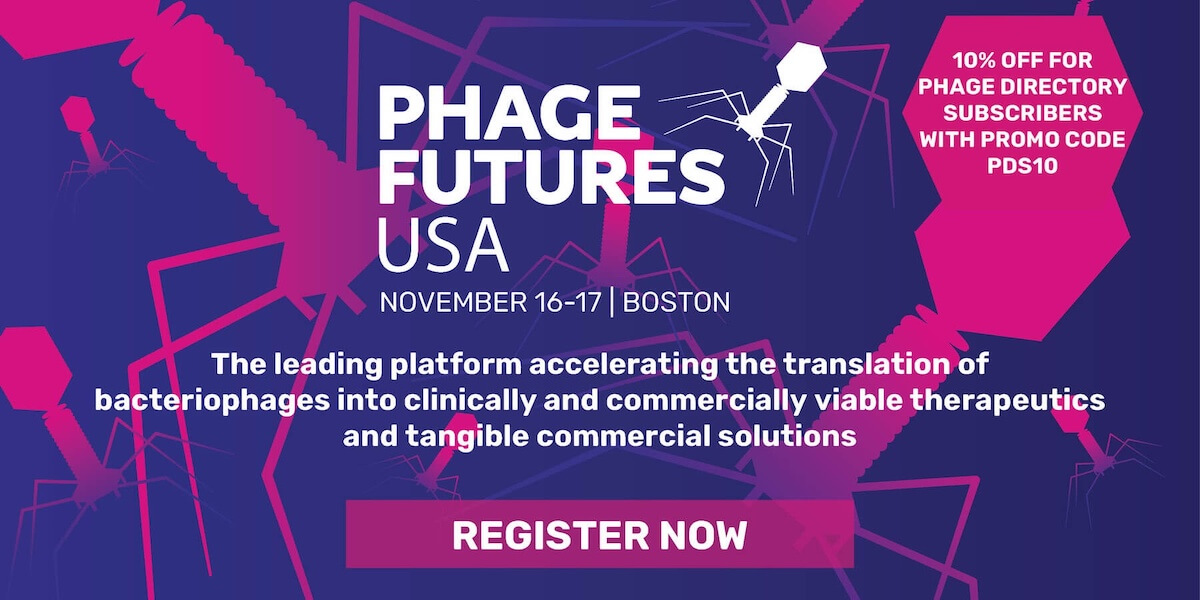The 6th annual Phage Futures conference was held on the 6th and 7th July 2022 in Amsterdam, The Netherlands, hosted by Kisaco Research. This was an exciting showcase of the ways phage translation into clinically viable solutions is being pursued around the world. The event partners were Cellexus, Vésale Bioscience and Jafral.
For this piece, we highlight some of our favourite talks from day 1 of the event:
Edith Hessel, Eligo Biosciences
The first speaker was Edith Hessel. She has been the Chief Scientific Officer (CSO) at Eligo Biosciences since 2014, where 46 people are employed from 12 countries, of whom 24 possess PhDs, at a 1:1 gender ratio. The company has raised $19 M in funding, and recently a deal of $226 M with GSK has been signed. Her talk, titled “Addressing antibiotic resistance via CRISPR mediated decolonization or in-situ editing” introduced the CRISPR killing platform and CRISPR Base-editing for bacterial infections such as E. coli and K. pneumoniae, thereby removing the gene responsible for the antibiotic resistance.
The CRISPR-based approach for therapeutic gene modification consists of a CRISPR nuclease, a therapeutic molecule and a base editor, known as an ‘eligobiotic’. The effectiveness of this depends on the host range, injection efficiency and resistance to digestive enzymes. The prime focus is to target pathogens such as Extended Spectrum Beta-Lactamase (ESBL) and Carbapenem-resistant (CR) E. coli ST131 and K. pneumoniae ST258, affecting liver and kidney transplant patients. Finally, she concluded with the latest project they are working on: beta-lactamase gene editing to combat antibiotic resistance.
Naomi Zak, BiomX
Naomi Zak is a Co-Founder and Director of Research and Development at BiomX; she has 20 years of experience in this field. She spoke about their ongoing clinical trial testing nebulized phage therapy for chronic Pseudomonas aeruginosa pulmonary infections in CF patients. Their company has developed a phage cocktail BX004 containing three phages; they have tested the efficacy of this phage cocktail under several conditions, including a combination with the antibiotic Aztreonam. They have used a specialized nebulizer whereby the recovery, residual volume, droplet size and distribution has not been affected. Currently, a proof of concept phase 1B/2A for safety and tolerability is being undergone where IND and Israel Ministry of Health have been cleared, funded by the cystic fibrosis foundation.
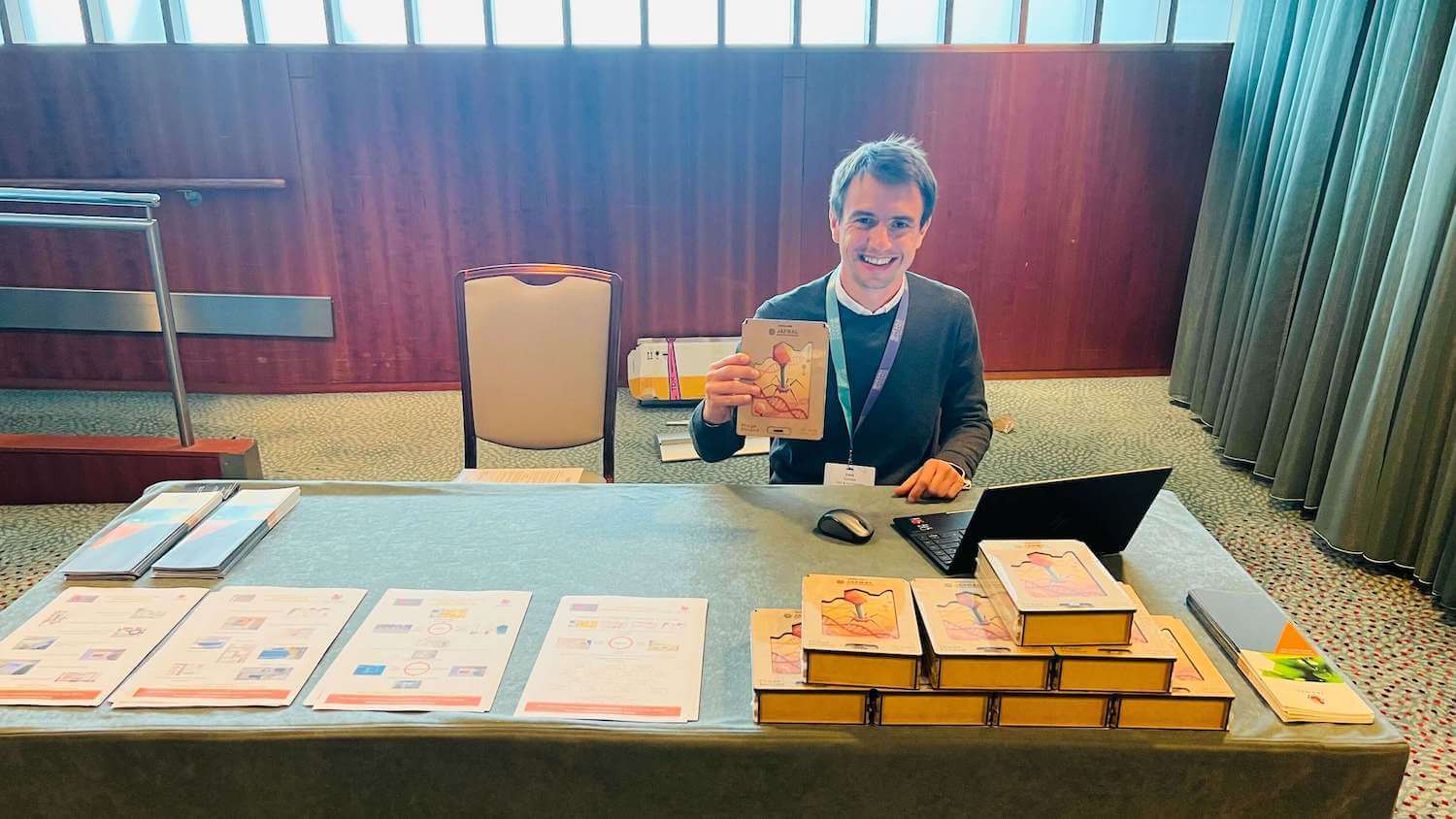
Frenk Smrekar of JAFRAL waits for eager phage-makers to find him at his booth.
Alexander Sulakvelidze, Intralytix Inc.
Alexander Sulakvelidze is the President and CEO of Intralytix, who was vital in acquiring the first ever FDA approval for phage-based food safety products in the world. Intralytix has been concentrating on Phagebiotix, a phage-alone formulation, and Superbiotix, which combines phage and antibiotic or pre/probiotics for application in infectious diseases, such as Shigella (with ShigActive phage along with ampicillin).
Initially, they tested seven commercial phage products and found that they all had significantly less phage than mentioned on the label. So, they focused on the science and the logistics required to have a stable product for maintaining the phage concentration.
Kristin Wannerberge, Ferring Pharmaceuticals
Kristin Wannerberger discussed “Ferring and phage - Exploring the secrets of the microbiome”. The primary focus of this biopharma company is on reproductive medicine, maternal health, gastroenterology, uro-oncology and pregnancy-related infections. Frederik Paulsen Sr founded this company in 1950 and was taken over by his son Frederik Paulsen in 1988. Currently, the sales have been expanded to over 100 countries.
Bob Blasdel, Vésale Biosciences
Bob Blasdel from Vésale Biosciences spoke on the “Rapid, routine, automated and disambiguated diagnosis of phage sensitivity”. He emphasized the need for routine diagnostic determination of phage sensitivity, and introduced the need for a rapid phagogram. He talked about how traditional methods such as spot tests and plaques assays are laborious, time-consuming and challenging to interpret. He introduced the luciferase-based phagogram and Inteliphage, a rapid diagnostic at the point of care. The phagogram requires no experience or specialized academic labour, and is user friendly with a fast turnaround time and easy standardization.
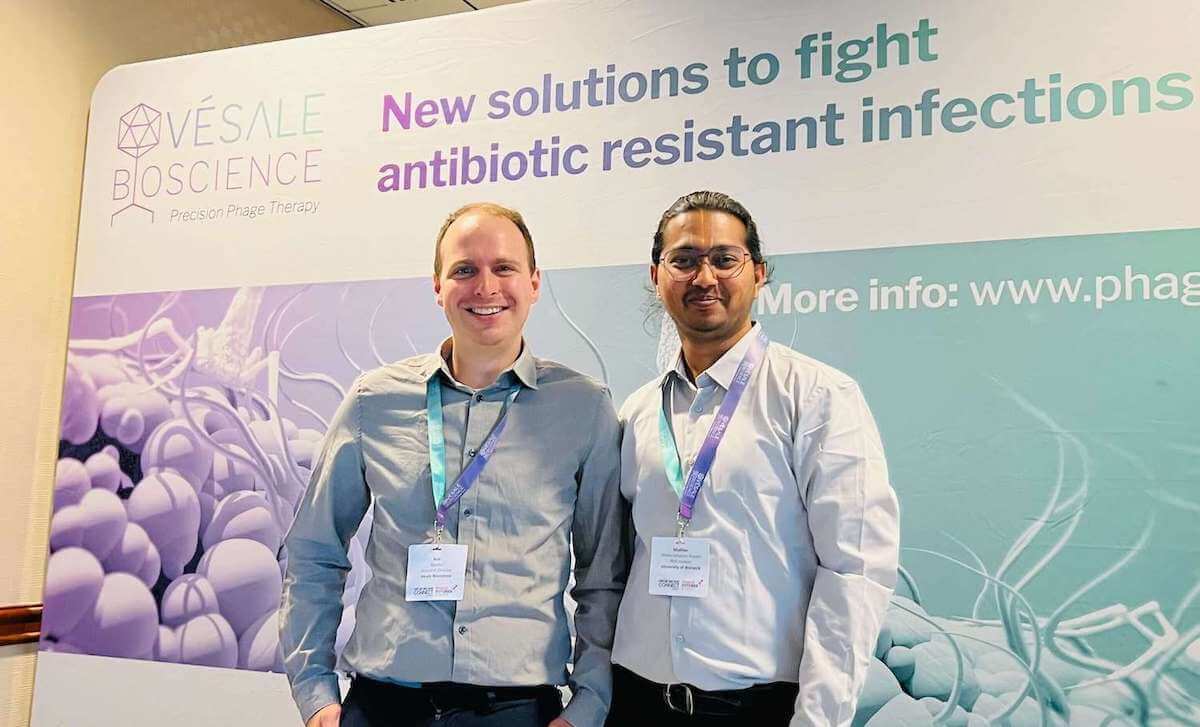
Madhav tracks down Bob Blasdel of Vésale Biosciences (presumably to discuss Vésale’s exciting new benchtop phage diagnostic).
Sofia Corte-Real, Technophage
Sofia Corte-Real is a Scientific advisor at Technophage, a small pharma started in 2005 and interested in bacteriophages, small domain antibiotics and zebrafish screening for chemicals on the market. She addressed the “Phage I/IIa study of TP-122 bacteriophage treatment for ventilator-associated pneumonia (VAP)”. The company has developed three phage solutions under TP-102 for Staphylococcus aureus, TP-122 for ventilator-associated pneumonia caused by Klebsiella pneumonia and Pseudomonas aeruginosa. The efficacy and toxicity were performed in Precision-Cut Lung samples (PCLS) (ex-vivo models).
Barbara Hubad, Jafral
Barbara Hubad is a Chief Operating Officer at Jafral, which was started in 2011 with both GMP and non-GMP-based phage products. It contains two certified GMP facilities in Ljubljana, Slovenia for API (active pharmaceutical ingredient) and drug products. Her talk on the topic of “Selection of suitable analytical methods for release and characterization of phage products” started with their current phase 1 and 2 trials for veterinary, food and cosmetic products. She explained the specification and test parameters required for a good phage product. It includes testing the physical properties, biological activity, identity, purity, and bioburden/sterility for characterization. Finally, she explained three crucial processes: visual inspection, titration of phages and total protein testing, and how it has been done in their company.
Gina Suh, Mayo Clinic
The talk on the “Successful case of adjunctive intravenous bacteriophage therapy to treat left ventricular assist device infection” by Gina Suh, an infectious disease specialist and head of phage therapy from Mayo clinic college of medicine, USA, shared two noteworthy case studies with LVAD infections.
Lorenz Leitner, Balgrist University Hospital
Lorenz Leitner, a Neuro-urologist from Balgrist University Hospital, spoke on the “Bacteriophages for catheter-associated urinary tract infections: lessons learned from the clinical trial”. He gave a brief introduction to UTIs and their traditional treatment process. Concerning their Randomized Clinical Trial (RCT) published in Lancet in 2021, he compared their outcomes with previous clinical trials. He stressed the need for an International Database on Phages: ‘The Phagistry’.
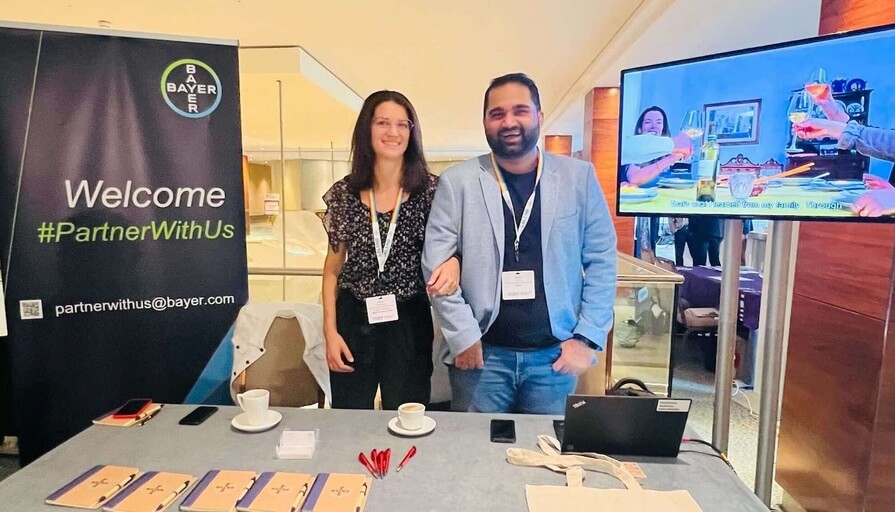
Bayer says ‘Partner with us!’
Danish Malik, University of Loughborough
Danish Malik is a Reader at the University of Loughborough, UK, and he discussed the “Manufacturing and formulation conditions for phage product development”. In their lab currently, they focus on the upstream production and downstream purification of phage products and their process development considerations. He listed the essential criteria such as quality by design, manufacturing, formulation & delivery considerations, scalable manufacture of high titre of purified phages, liquid formulation and dry powder forms. He emphasized the concerns for liquid formulations such as pH & buffer type, ionic strength, excipients, surfactants and antioxidants. In his lab, they have formulated 100s of phages for therapeutic usage.
Jean Paul-Pirnay, Queen Astrid Military Hospital
Jean Paul-Pirnay is a Senior Scientist and Head of the Molecular and Cellular Technology Laboratory at the Queen Astrid Military Hospital, Belgium. His talk on advice drawn from phage therapy-case reports untangled the nuances in using phages for therapy. He spoke about the process from the isolation of a bacteriophage to cleanroom amplification to the clinic. He briefly spoke about the Phagoburn trial where 13 lytic anti-Pseudomonas phages were used and the need to co-evolve phages with host bacteria, as it provides an advantage for phage training. He introduced two case studies where a one-year-old was treated for XDR Pseudomonas infection. They used antibiotics in synergy to successfully treat the condition in the second case, where a 30-year-old was treated for Klebsiella pneumoniae with a pre-adapted phage and an antibiotic with enhanced clearance and a lower rate of resistance.
Further, he illustrated the characteristics required for a successful randomized controlled trials in phage therapy, where defined phage products are needed. He concluded by explaining the Belgian Magistral phage concept and the ultimate need for cell-free and on-site production of synthetic phages.
That’s it for day one of the conference! Stay tuned for our highlights from day 2, coming soon!

